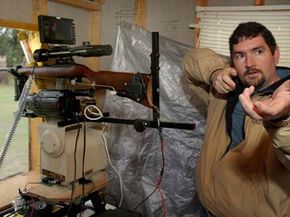Hunting season has ended, but you're not ready for it to be over. It used to be there were only two options: play deer-hunting games or participate in simulations online. But now, there's another option: Internet hunting. This recent phenomenon has caused controversy in the hunting community, but why?
In 2005, a Texas rancher began using a remote-controlled .22-caliber rifle and a camera set up on the Internet to provide hunters with access to game animals on his ranch, such as wild pigs, sheep, blackbuck antelope and Barbary. He charged fees for the remote hunting sessions, a DVD recording of the session, taxidermy and meat processing [source: BBC].
Advertisement
The game animals were kept penned, lured to a feeding station near a spot where a rifle was mounted, and shot at close range. If the shot did not kill the animal at once, or if the person missed, workers at the ranch killed the animal. The trophy was then shipped to the remote hunter [source: Humane Society].
This practice resembled that of the canned hunt, in which both native and exotic species were kept penned in fenced enclosures, awaiting hunters who picked them off at short range. The animals came from zoos, breeders, circuses and animal handlers. Yet, Internet hunting went a step beyond the canned hunt.
The founder of Internet hunting believed the practice could be a boon to hunters who were disabled and no longer able to go out into the woods. It also was less expensive than flying to Texas [source: BBC].
However, Texas soon became one of more than 30 states to ban the practice amid concerns for the well being of the animals and for a game that allowed the use of weapons at a distance [source: Fox News]. The Texas rancher's Web site was removed, though others soon took its place.
Internet hunting has its foes. Some even question whether the practice should be legal. Read on to find out more about the legal and ethical issues.
Advertisement



